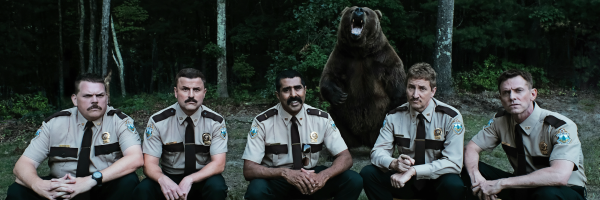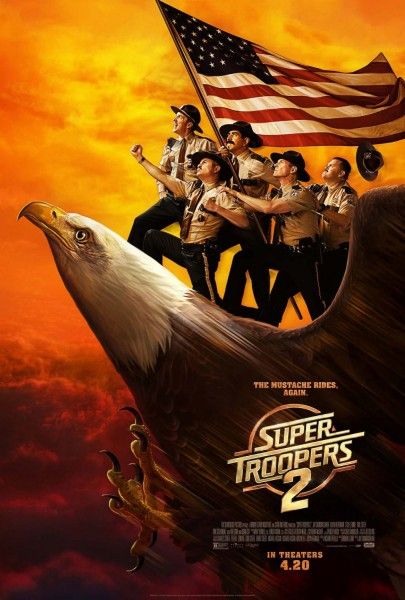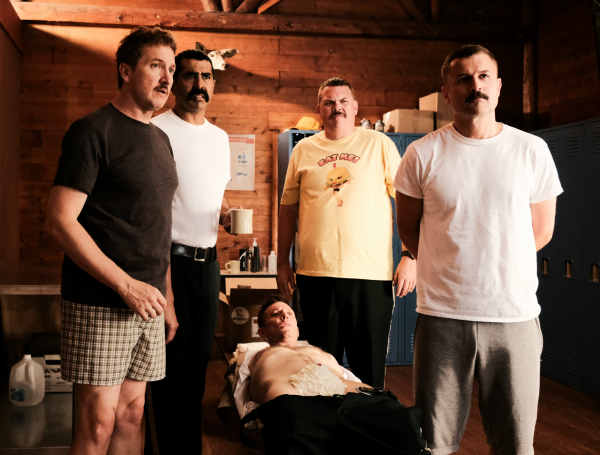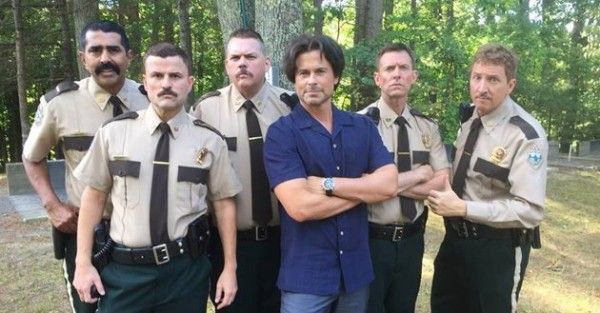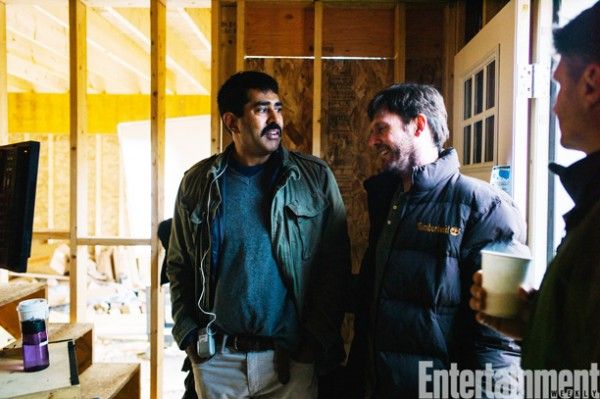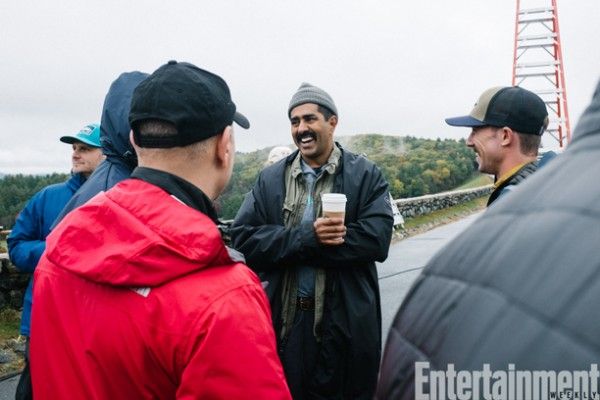Since its release in 2002, Super Troopers has gone on to become one of the most beloved cult comedies of the 21st century. It’s instantly quotable, uniquely weird, and far more than the stoner film the original marketing campaign sold it as. With such a devoted following, fans always wondered if a sequel might happen, and with the help of an Indiegogo campaign, Super Troopers 2 is almost here.
A couple weeks ago, I got to speak with the group behind Super Troopers and Super Troopers 2, Broken Lizard—Jay Chandrasekhar, Steve Lemme, Kevin Heffernan, Paul Soter, and Erik Stolhanske—at the Sweetwater Brewery in Atlanta. During our conversation, we talked about what they learned about crowdfunding a movie, what their writing process is like, lines from the first movie that always get quoted at them, a scene they were disappointed to cut from the script, and more.
Check out the full interview below. Super Troopers 2 opens April 20th.
Can you talk a little bit about the funding of the film and how it kind of came together in terms of production?
STEVE LEMME: Yeah. I mean, I think the only studio that could make Super Troopers was Fox because they own the rights to it, and they didn't really want to do that because I think they felt that the fans weren't out there, so this was ... but they said we could go ahead and raise the money ourselves, if we wanted to. So we took traditional routes and tried to get financiers to come in on it and nobody would come in on it ... and I think they had the same fear, that fans weren't out. So we did this Indiegogo campaign, and we hired the crowd funding guru, Ivan Askwith ... and so we did this campaign and raised four and a half million dollars and really that's how we got the movie done.
PAUL SOTER: Yeah it was funny. We thought it was a very simple kind of process, how you crowd fund ... you make a little video, you tell people the deal, you offer whatever shirts or posters ... and this guy came in and showed us what a science it is, and it's just unbelievable when you do it right. Just things like the level of imagination that has to go into all the perks and the content and creating lots of content to keep the process refreshed ... and it was fascinating to see the science behind how that gets done right. It worked for us, ya know?
ERIK STOLHANSKE: Well, they do have to create a campaign. I mean we started like six weeks before we launched, it was like a political campaign. Campaign Farva in the trunk ... somebody might come and check back every day to see if he's ever going to get out, so we're bringing people back .... and really incorporating the fans and making sure that you're making a movie with them and incorporating them in the process.
Did it exceed your expectations in how much people responded in terms of what you thought the baseline would be and how far beyond it went to that?
JAY CHANDRASEKHAR: I mean there was a great fear that people would be like, "Yeah, we loved that first movie, but you guys just ... why should we pay for it?" And so if that had happened there would be no sequel. So it's literally ... I mean, so we put the number at 2 million bucks. You can't really make the kind of movie we make for 2 million bucks anymore. And so yeah, that happened in 24 hours ... and in 30 days it was at 4.5. I think it's at 4.75 now. I mean, it's done, but that's the number.
SOTER: It's funny because there's this celebration of like, "Oh wow, yeah. They're out there. They stepped up. We got this money." Followed by the inevitable like, "Gah, why didn't we set the bar higher because then we could have gotten all the money," because we still had to go out and raise money, and that still took forever. You have to ... what I didn't understand at the time is you don't spend that money within the calendar year, you get killed on all these taxes. So we had to go out and start shooting the movie without having the money to make the movie. So we went and shot for a week ... then had to go raise the rest of the money and then go back. And that's just a bizarre way to do things too ... so everything about how this movie was made was different than anything we'd ever done.
And comedy sequels are really tough. What was it like going through the script and being like, "How many callbacks do we make to the first movie? And how much do we just go out on the limb and try to do something new that we hope people will go for?"
LEMME: That was the big internal conversation, creatively, was how much to refer back and how much is too much. You know you don't want to do the exact same movie, but you also don't want to deprive the fans of some of the things that they liked about the first one ... like the pullovers and some of that stuff ... so you know, we had never made a sequel before either. We just knew ones that worked and ones that didn't work, so I think-
KEVIN HEFFERNAN: We had made one on from the script writing all the way through the process in how much we pull back on what we call jokes. We think we did alright.
SOTER: Yeah, we tried to just not ... like you'd see it in a sequel where you're like, "What really is this? You just told the same joke again." And that was sort of where we drew that line of like, "Okay, does it feel like a new spin on it? Does it feel like just a funny quick little pun that will make people remember the original?" So we just didn't want to be accused of rehashing ... because that's kind of the worst thing that feels like you could fall into for doing a sequel.
LEMME: Yeah, and probably the thing we were also anxious about was the opening scene of the first movie was, amongst fans, it was beloved ... and we kind of knew we had to either top it or at least match it, you know? We couldn't just limp in with something weak, and so we focused a lot on the opening scene of the movie.
And what's your writing process like? Because one of the things I love about the first movie is that you have these big jokes that like land with you the first time you see it, and then there are all these little jokes that really take off on repeat viewing.
CHANDRASEKHAR: I mean, we hang out enough in bars at night and funny things happen, and we try to take those funny things from our real life and figure out a way that organically get them into the movie under the idea that if we thought it was funny then it must be funny ... so if we can figure out a way to set it up and put this joke into the movie, it will end up being funny to people too.
SOTER: And then it is that fun part of saying, "Okay, well now let's go through and think about all the things that won't be caught until the second time, maybe the third time," and those are always end up being our favorite jokes, because they're a little more sneaky or they're just a little more weird ... and we were having a conversation with somebody last night about Club Dread who was talking about how much they love the movie, but who we ended up talking about this scene and this bit, and we realized this guy who had seen this movie 10 times hadn't caught the joke. He was like, "Oh yeah, yeah, holy shit. Yeah, that's awesome." And like, yeah I know, it's like we want to bury stuff in there so that every time you go back, you find something you didn't find before.
LEMME: Yeah that guy was funny because he was like, "Club Dread is my favorite one of your movies. Why do you think it didn't do as well as the others?" And we were like, "Well, I actually think there were a lot of jokes in that movie that people don't get." And he was like, "Like what?" And we told him one he didn't get that-
Which joke?
SOTER: The Machete Phil. He never understood Machete Phil.
LEMME: You know, I think the nice thing about working with five guys is that if we're all laughing at something ... each one of us has a different sensibility so some guys are dirtier, some guys are more pun-ish, some guys like old time comedy, and some guys like political stuff, whatever it is ... like if all five of us are laughing and we feel like we can pretty much please the audience with that joke.
What made it about Super Troopers 2 that y'all said like, "We want to make this our next movie," rather than a sequel to another film that you guys made or just a new title?
HEFFERNAN: I know that there's a lot clamoring for it ... wherever we go, whatever we do, people are always saying, "When's the next Super Troopers?" I think it became an admirable thing where we were like, "We gotta deliver on this."
CHANDRASEKHAR: Showbiz works well when you give the audience what they want. We decided to do that.
HEFFERNAN: But also it was fun to re-visit the characters. They were characters we all like and lived with for years, so it was fun to do a new thing with the same characters.
STOLHANSKE: We didn't want to make a sequel right away, like some other movies do, because we have a sketch comedy background and we want try different characters, different plot lines, and we felt like the time was right.
And for the first Super Troopers, was there like a particular line that people keep coming up to you guys for? Like one that more than others that you guys just keep hearing?
CHANDRASEKHAR: Who wants a mustache ride?
LEMME: You boys like Mexico.
HEFFERNAN: I get a lot of litre-of-cola and shenanigans.
STOLHANSKE: Chugging Maple Syrup.
HEFFERNAN: A couple of chicken fuckers.
So with this process being able to use IIdiegogo to help power this sequel, is this something that you'd want to do for your other films?
CHANDRASEKHAR: It depends really. I mean, crowdfunding has changed so that if you crowdfund a movie now as opposed to when we did it, people can own back into the film. It's a different kind of trade they're making. I don't know. I mean, talking to our crowdfunding guy, he thinks that it's an entirely different kind of crowdfunding. It's more of a way for people to gamble on the movie business. I don't know. I think that things have changed so much. It would be crazy to say we wouldn't crowdfund a movie again. I mean, I think we would under the right circumstances, but there's also a lot of money out there to make movies and TV, so we'll see. It was a very rewarding experience, very time intensive, but we'll see. We'll see.
LEMME: One of the coolest things ... I mean, to me aside from getting the movie made, the coolest thing about it is how much it's connected us with the fans. All these screenings are Indiegogo backers who you run into people on the street who are like, "Hey I donated to your campaign," and it's a genuine feeling of bonding with these people, and it's cool, because I don't know that without the campaign that we would ever get a chance to really, really, really connect with these people, and it's rewarding and it's cool.
How much has the industry changed from your perspective to go from '02 to shooting this in 2016?
SOTER: Yeah. I think it's changed a ton, and it was a big reason why it was so difficult to get this financed is that whole mid level ... like everything's either a gigantic budget movie or it's a micro budget movie, and we don't operate on either of those ... all of those kind of mid-level companies, and fortunately Fox Searchlight still exists, but there used to be a ton of those, and so -
HEFFERNAN: It's also the DVD game. We made our splash in the DVD market, and we were a DVD that got passed around and got bought ... now the DVD market doesn't exist anymore. So it's a whole different kind of wild west, like how do you get your movie out there? That was a different thing when we brought our movie.
Well, I am so glad that this one is getting distributed into theaters, because I feel like watching it with a crowd it's a more rewarding experience, and I didn't get a chance to see the first one in the theater. I was one of the people that caught it on DVD and really grew to love it, but with the sequel, just seeing it with that crowd last night, they really -
SOTER:: They were so rowdy.
LEMME: That Atlanta was certainly the drunkest crowd on the tour so far.
HEFFERNAN: It was impressive.
LEMME: Yeah, I say that as a good thing. It was awesome. It was a great crowd.
So when you're taking this film out, when you're done with it, do you guys do like friends and family screenings? How do you sort of fine tune the film to like know which jokes are working, which to cut?
CHANDRASEKHAR: Yeah, we screen it for about 100 people, but you can't totally tell all the jokes from 100 people, you need about 200, really, to really be about to understand whether a joke is working.
HEFFERNAN: We did levels. We did probably about like four or five times. We did like 20 people, and then we did 100 people, we did 200 people and 400 people.
SOTER: What I thought was hilarious is we did a ... the studio test screening in Anaheim was done, and Kevin had the idea to record the audio so that when we could go back and play the audio against the picture to hear the laughs ... so he's recording while he's watching the movie and then Lemme comes in and sits down next to him and starts eating nachos ... and so this whole process now, we're going back and we're trying to fine tune the movie based on that, listening to the soundtrack, and all we can hear is Lemme eating nachos.
HEFFERNAN: 20 minutes of nacho eating.
LEMME: And the wrapper. Another cool thing is sometimes there are jokes that aren't really even written in as jokes but just something that are inadvertently funny and gets people every time. Like I'm loving this Brian Cox thing where he says, "Yeah we're going to go up to Canada." And I'm like, "I love Canada," and he's like, "Good one, Mac!" And people fucking love that joke, and it was such a throwaway line.
Was there any scene that you were kind of pained to leave on the cutting room floor because just timing wise it wasn't working or anything like that?
HEFFERNAN: We were pretty precise. Since we had limited money, I think for the first time we wrote a script that we shot pretty much everything that we wrote. We took everything out that was on the level before we went up to Boston and shot it because we knew that we were limited on our time and money.
STOLHANSKE: We had to cut about 20 pages out of our draft to get it to what it is.
HEFFERNAN: Which we did right? Right before we-
STOLHANSKE: Yeah, right before we shot we cut out like 20 pages.
LEMME: There was one in the scene were Farva and I go lip to lip ... there was an angel devil that popped up on my shoulder, and I forgot about it until we saw a behind-the-scenes documentary, and isolated it's pretty funny. It could not have worked in the movie, but I was sad that that didn't make it in the final cut.
SOTER: But at least there is this footage that exists of you in an angel costume and a devil costume, and it's seeing Mac as an angel and devil is delightful, so people will see that at some point.

